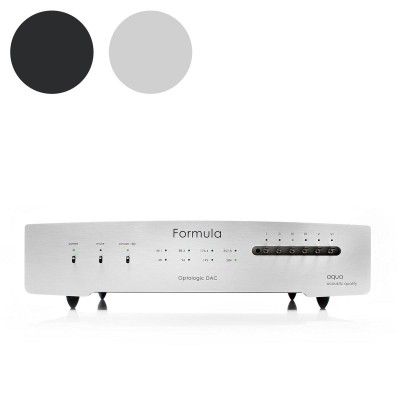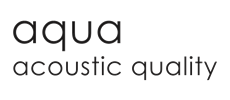Formula xHD Rev. 2
The Optologic R2R Conversion System
Aqua believes that the more musical D/A conversion system is based on the circuit usually identified as "resistor ladder".
This technology has been substituted in the mass-market by the so-called sigma-delta converters.
The sigma-delta converter is a near-completely digital circuit and for this reason it can be can be integrated on silicon and produced at low-cost.
A quality resistor ladder DAC instead uses a circuit based on a set of high precision discrete resistors: at least 2 resistor banks, one for each stereo channel.
The Formula DAC is the first in the aqua’s production to show a proprietary D/A conversion system, that we name Optologic.
The signals sent to the resistor ladders are generated by a proprietary digital circuit, implemented inside an FPGA (Field Programmable Gate Array).
Formula has a sign-magnitude converter structure, and this requires not two but four 24 bit resistors banks, each one made of very low tolerance discrete resistors.
In order to separate the digital section from the sensitive analogue circuits, galvanic and magnetic isolations are implemented between the FPGA and the four branches of the R2R ladder converter.
This creates complete isolation of all digital circuitry - including the clock - from the analogue section, for a clean, noiseless ground plane. It also plays the main role in the differential management of the R2R ladders, achieving perfect symmetry between the counter-phase halves. The result is the highest tonal contrast and naturalness.
Pure 1x Native Sample Rate DAC
The Formula, like the other aqua models, is a digital filter-less DAC. Our conviction is that in spite of the instrumental measurements showed by upsampling / oversampling DACs, they rarely are able to produce the same emotional and realistic results.
Modularity
A third important aspect in the aqua production is the modularity of the various electronic circuits.
Aqua equipment are not short life products: as modular, they are open to future improvements and to follow the evolution of the technology.
Formula is made of a set of circuits every one developed on a separate printed circuit board easily interchangeable.
As an example, each of the four resistors banks of the converter is separate and mounted on connectors.
State of the Art Digital and Analogue Electronics
As explained before, the Formula DAC uses no digital filter or any other compensation, relying instead on maniacal attention to each sub-circuit.
The separate analogue and digital power supplies are executed purely by extensive use of discrete BJT, MOSFET, J-Fet and ultra-fast diodes. Passive parts were selected not just for the best sonic result but also for their top quality, longevity and reliability. With the exception of six superior electrolytic capacitors, all other caps are Tantalum, solid-polymer OS-CON and double-metalised MKP.
The signal path itself is direct-coupled and completely capacitor-free.
The two output stages (one single-ended, one transformer-coupled balanced) use discrete BJT and J-Fet with metal-film resistors. All the electronics parts show an ultra-low RF noise.
An advanced ARM microcontroller manages the user interface on the front panel, the IR remote command and the communication port (serial, RS232 standard).
The xHD Update
This update has required significant optimisation of code for the main FPGA of R2R ladder DAC which has improved sound quality.
The new hybrid USB XMOS xCore 200 (dual core) + FPGA circuitry enables the high-resolution file playback up to 768kHz PCM and native DSD512
xHD Improvements:
- Proprietary hybrid 2-stage XMOS xCore XE216 + FPGA
- Fully-floating (isolated) USB decoding and clock generation by FPGA with proprietary code
- High quality, long life, low noise parts and modular design that distinguish aqua – acoustic quality equipment
- Sample rate in “Bit Perfect” up to 768 kHz PCM and DSD512
- Latest version of customised XMOS X Core Driver on Windows OS (W7, W10)
- Native X Core Audio on Mac OS (Bit Perfect)
- USB Audio 2.0 operation on Linux (Bit Perfect)
Analogue Module Rev. 2
New level of sonic performance. The new boards implement new output transformers, specially selected super-fast active components and improved polarisation of circuitry.
Key Features
- Proprietary Optologic D/A conversion system. Pure R2R ladder - FPGA (Field Programmable Gate Arrays) based without digital filter
- Galvanic and magnetic isolations between the FPGA and the four branches of the R2R ladder converter
- Jitter free digital interface AQlink PRO (I2S protocol), uncompromising digital connection to La Diva CD transport
- Discrete R2R ladder DACs with low noise precision resistors
- Zero S/PDIF Jitter design, digital receiver stage PLL (phase locked loop) technology
- High-performance AQ Discrete Regulator (MOSFET, J-FET, BJT) for analogue and digital DAC’s power supply
- 2 separate low noise C-Core power transformers, one for the analogue and one for the digital section
- MODULAR DESIGN with upgradeable multi board platform
- Transformer-based true balanced audio output stage
- Fully upgradeable high-speed USB hybrid 2-stage XMOS xCore XE216 + FPGA, Fully-floating (isolated) USB decoding and clock generation by FPGA with proprietary code
- Proprietary USB Firmware / driver: Apple MAC OS - Linux OS : USB asynchronous native support, no need to install drivers software
- Digital phase selector on front panel
- High-quality parts selected for sound quality: Tantalum, solid-polymer OS-CON and double-metalised MJP capacitors
- Low noise Metal Foil ultra-precision resistors
- Double metallised film pulse capacitor
- Ultra-fast diodes
- Halogen free cables
- Aluminium anti-resonant cabinet with Nextel
- RC5 IR remote controller (optional)
- Designed and handmade in Italy
| Specifications | |
| Digital to Analogue Conversion Type | Proprietary Optologic D/A Conversion System, Pure R2R Ladder - FPGA (Field Programmable Gate Arrays) Based Without Digital Filter |
| Supported Native Sample Rates | AQlink / I2S Serial Bus - USB PC Audio : 44.1 kHz to 768 kHz PCM up to 24 Bits, DSD64, DSD128, DSD256, DSD512, Supports Native DSD via USB and DoP on All Inputs |
| DAC Architecture | Multibit Sign Magnitude R2R Ladder (Upgradable) |
| Asynchronous USB (High Speed) | USB Audio Class 2 with Type B Connector |
| Digital Receiver | PLL (Phase Locked Loop) Technology 128 or 256 FS Internally Selectable |
| AQlink (I2S Bus) | LVCMOS Level |
| Oversampling Factor | 1x |
| Digital Inputs - RJ45 AQlink (I2S Serial Bus) | PCM 24 Bit / 768 kHz – DSD64, DSD128, DSD256 via DoP |
| Digital Inputs - BNC Coax (S/PDIF) 75 Ohm | PCM 24 Bit / 192 kHz – DSD64 via DoP |
| Digital Inputs - RCA Coax (S/PDIF) 75 Ohm | PCM 24 Bit / 192 kHz – DSD64 via DoP |
| Digital Inputs - AES/EBU Balanced 110 Ohm | PCM 24 Bit / 192 kHz – DSD64 via DoP |
| Digital Inputs - USB Port | PCM 24 Bit / 768 kHz – DSD64, DSD128, DSD256, DSD512 |
| Digital Inputs - AT&T (ST Fibre) | PCM 24 Bit / 192 kHz – DSD64 via DoP |
| Digital Inputs - Optical TOSLINK | PCM 24 Bit / 96 kHz – DSD64 via DoP |
| Analogue Outputs | Unbalanced: 2 RCA Output 2.4 V RMS, Balanced (Passive Transformer's Symmetrical): 2 XLR Output 3.8 V RMS |
| Output Impedance | 10 Ohm RCA - 600 Ohm XLR |
| Load Impedance | 10 kOhm (Min.) RCA - 600 Ohm XLR |
| Frequency Response | 20 Hz to 22 kHz +0.5 dB / -0.5 dB |
| Phase Response | Linear Phase |
| THD + N | 0.016% at 1 kHz 0 dB |
| Main Processor | STM-ARM Microcontroller |
| Controls | 9 Button on Front Panel, IR Remote, Isolated RS-232 D-SUB 9-Pin Connector |
| Front Panel | Power, Phase Invert, Mute, Input Switch, RC5 Remote Sensor |
| Power Consumption | 100-115 V / 220-240 V; 50 or 60 Hz - 58 VA |
| Dimensions (W x D x H) | 450 x 370 x 100 mm |
| Weight | 9 kg |
| Front Finish | Satin Alu Silver or Satin Black |
| Case Finish | Grey Nextel Powder Coated |
Write a Review
Note: If reviewing a product that has variations such as colour or length, please include this information at the start of the review. For example "Colour: Red" or "Cable Length: 2m" etc.
Your Name:Your Review: Note: Plain text only (HTML is not translated).
Rating: Bad Good












